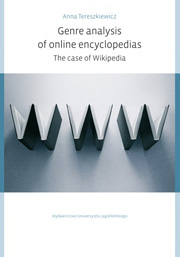Summary
The analysis undertaken allows us to identify the main tendencies in the development of the genre of online encyclopedias. The collection of the analysed web sites proves that encyclopedias have evolved from a mere reproduction of the genre towards highly complex, dynamic and audio-visual resources which fully exploit the potential of the internet. All these innovations illustrate an expansion of the traditional notion of an encyclopedia. Moreover, the interplay of diverse processes affecting the genre has led to the emergence of various sub-types of online encyclopedias characterized by distinctive properties of the generic structure, substantially different from standard print encyclopedic works.
The influence of the medium on the evolution of the genre is best exemplified by the emergence of Wikipedia. The comparison of Wikipedia and print encyclopedias allows us to distinguish a number of similar and a few differentiating features between the two manifestations and to illustrate how the genre of encyclopedia, influenced by social and technological determinants, is being reshaped in a new environment, which constitutes a confirmation of Yates and Orlikowski's (1992) theory concerning the evolution of genres. Changes indicating a departure from the conventions are reflected in the alteration and expansion of the functional, pragmatic, stylistic and structural properties of the genre. The transformations confirm our initial assumptions concerning the extension of conventional components of the genre in the case of Wikipedia.
- Type
- Chapter
- Information
- Genre Analysis of Online EncyclopediasThe Case of Wikipedia, pp. 169 - 172Publisher: Jagiellonian University PressPrint publication year: 2010



